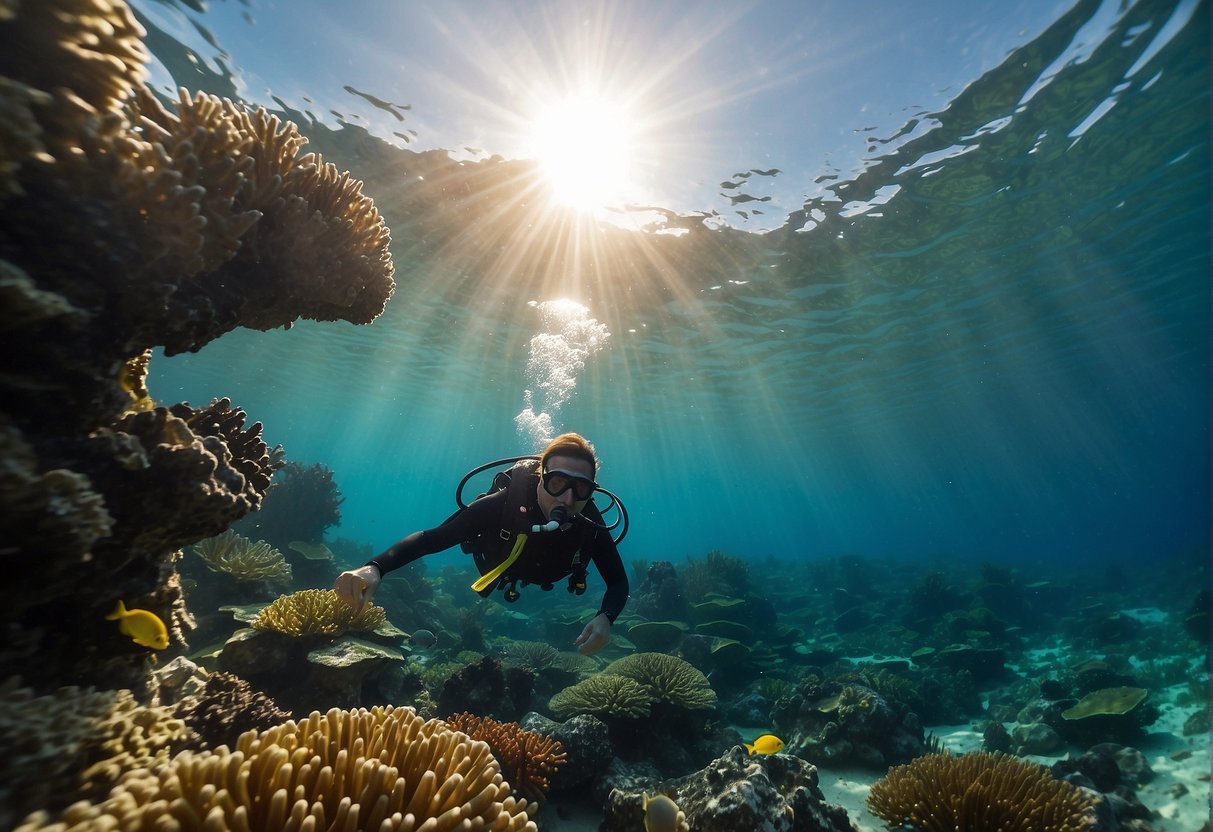📦 FREE Shipping
How Many Calories Do You Burn Scuba Diving 2024: Surprising Insights

Dive into the depths of fitness with “How Many Calories Do You Burn Scuba Diving: Surprising Insights” as we explore the unexpected calorie-burning effects of this underwater adventure.
How Many Calories Do You Burn Scuba Diving?
Diving into the aquatic realm as a scuba diver requires your body to work hard. Due to several unique factors, you burn calories much differently underwater than on land.
Water Resistance: Each movement underwater is against a denser medium than air, increasing the energy your muscles exert. Muscle mass plays a key role here, as more muscle means a higher calorie burn.
Temperature Regulation: The water’s temperature demands that your body maintains core temperature through thermogenesis. Cooler temperatures make your body work harder to preserve heat, leading to higher caloric burn. In warmer waters, this effect is less pronounced.
Physical Exertion: Your effort in swimming, fighting currents, and managing your equipment can significantly increase your burn calories.
Dive Duration: The longer you stay submerged, the more energy you use. Scuba dives typically last 30 minutes to an hour, influencing your total calorie burn.
Given these factors, estimates suggest you burn between 400 to 700 calories per dive. These numbers can vary based on the specifics of your dive and physical condition. To quantify this, calorie-tracking tools and metabolic equivalents (METs) help calculate energy balance with greater accuracy.
Influencing Factors on Caloric Burn

Effect of Diving Conditions
Water Temperature: Your body burns more calories in cooler water due to increased thermal conductivity, requiring more energy to maintain your core temperature. Diving in cold water with a drysuit might have you burning calories at an accelerated rate compared to enjoying the ease of tropical waters.
- Currents: Battling a strong current can feel like an intense strength training session. The extra finning action significantly increases caloric burn as you work harder to maneuver and maintain your position underwater.
Role of Scuba Gear and Equipment
- Scuba Gear: The weight and design of your gear impact the effort required to dive. Heavier setups demand more energy, which leads to higher caloric expenditure. Advanced breathing techniques also play a part; efficient breathing can extend dive time and influence calorie consumption.
- Wetsuits and Drysuits: Beyond insulating, the type of suit affects your buoyancy and, subsequently, your energy output. A snug wetsuit in temperate water or a drysuit in icy conditions will demand different exertion levels, modifying your metabolic rate and caloric burn during a dive session.
Maximizing Calorie Burn While Diving

Optimizing Your Dive for Fitness
Engaging in scuba diving as part of your fitness routine fuels the calorie burn akin to robust exercises like jogging. To ensure you’re making the most of each dive for fitness:
- Control Your Buoyancy: Mastering buoyancy isn’t just about safety and comfort—it’s crucial for maximizing effort. The better your buoyancy, the more you’ll work your muscles against the water resistance, which can increase your calorie burn.
- Keep Moving: Constant movement during your dive, whether it’s swimming against a current or exploring the sea bed, means your body is working harder. This endurance swim classifies scuba as an excellent cardiovascular workout.
- Stay Warm: Maintaining body temperature in cooler waters increases your basal metabolic rate, which in turn accelerates calorie burning. Appropriate thermal protection, like wetsuits, helps mitigate the risk of hypothermia while keeping your calorie furnace burning.
The calorie burn will also vary based on personal factors such as your gender, body composition, and overall physical fitness. Here are quick pointers catering to these aspects:
- Gender: Typically, men have a higher basal metabolic rate than women, which contributes to a higher calorie burn.
- Body Composition: Muscle tissue burns more calories than fat tissue. As your lean muscle mass increases, so does your fat burn potential during diving.
- Physical Fitness: Regular exercise boosts your fitness levels, potentially increasing calorie burn since fitter individuals can often exercise with greater intensity and for longer durations.
FAQ:
Why does scuba diving burn so many calories?
Scuba diving burns many calories due to the resistance of water movement, thermal regulation in cool water, and the effort to control breathing and buoyancy.
Is scuba diving a good workout?
Yes, scuba diving is a good workout, engaging your core, improving flexibility and stamina, and offering resistance training due to water pressure.
Is scuba diving a good way to Lose Weight?
Scuba diving can be a good way to lose weight as part of a broader fitness and diet plan, as it helps burn calories and build muscle.
How many calories do you burn on a 45 minute scuba dive?
On a 45-minute scuba dive, you can burn approximately 300 to 600 calories, influenced by factors like water temperature, currents, and your own physical effort.
If this article about “How Many Calories Do You Burn Scuba Diving” helped you, don’t forget to leave us a comment below about what you think of the article.

